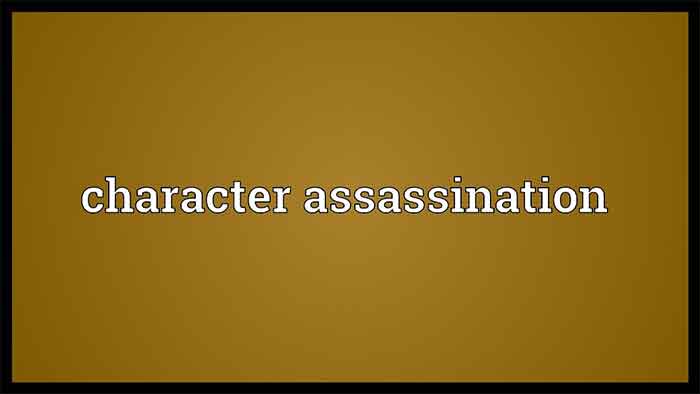
What is character? Character indicates totality of feature of an individual’s personality, courage, commitment and outlooks from righteousness to humility. The material or physical representations or moral frameworks are not character. Class, gender, race, sexual orientations, religious practice and moral values do not represent character. Character is a commitment to one’s own self, to one’s own family, friends, society, state and beyond. And character assassination is as old as human civilisation.
The character assassination manifests itself in different ways by spreading factually incorrect information, rumours, lies, misquoting, misrepresentation, silencing, acts of vandalism, name-calling, mental illness, creating false perceptions, and sexual deviance. These are discussed in detail in Martijn Icks and Eric Shiraev’s edited volume on “Character Assassination throughout the Ages”. The criminal tribes, underdeveloped rural poor, dirty working classes, unhygienic lower castes, characterless women and brainless blacks are some of the examples of stereotypes-based character assassination campaigns against different groups of populations in the world. The Nazi regime has flourished by discrediting Jewish population. The anti-terrorism campaign has shaped post 9/11 world by demonizing Muslims. It is often used against women, working classes, minorities, and revolutionaries to tame their creativities and emancipatory potentials.
Why do people follow the strategy of character assassination? Is it for the sake of defeating or winning in an argument? What are the aims and objectives of character assassinations? Is it spontaneous or pre planned? Is it a mechanism of self-defence? Is it a product of anger, revenge, frustration and jealousy? Who fears character assassination and why? Who are the victims of character assassination? These are some of the questions central to understand the ideology behind character assassination. The time, place, people and their social, political, cultural and religious conditions shape the ideology of character assassination. From politics to personal lives, from villages to cities, from corporate world to literature, character assassination continues to be an intoxicating strategy adopted by both opponents and friends alike in different stages of life.
Character assassination as a form of smear campaign is an old and powerful strategy of social, political and cultural control of individuals and their freedom. Character assassination is a deliberate attempt to demoralises a person or a community by destroying their image with the help of spreading rumours, lies or facts to reduce their abilities to actively engage with themselves and with their fellow beings. It hurts the victims by diminishing their reputation and achievements in public eye, which disables the victims to achieve their goals successfully. In 1950, Jerome Davis published a book called “Character Assassination” which outlines “fear, ignorance, envy, suspicion, malice, jealousy, frustration, greed, aggression, economic rivalry, emotional insecurity and an inferiority complex” as reasons behind character assassinations. Jerome Davis was a sociologist and a labour organiser. His book is an autobiographical reflection on self-defence against personal attacks.
There are different types of character assassinations but the objectives are very similar. The idea is to discredit the abilities, integrity, charisma, intellect and power of an individual, a group or an institution. It often leads to deaths and destitutions. Character assassination is a dangerous strategy of demonization, which silences people and their voice of reason. Therefore, it is important to understand it and fight back to ensure truth to prevail. Silence is not an option in the age of post truth world dominated by the mass production of fake news. The reactionary ruling classes run character assassination campaign against the alternative forces to control and monopolise state power and control the society without facing any radical challenges of transformation.
The fascist forces indulge in character assassination of the past leaders to legitimise their politics of otherness and hegemonize their power over public. Harriet Flower has coined a concept called “memory sanctions,” in her book “The Art of Forgetting: Disgrace and Oblivion in Roman Political Culture”. The idea of ‘memory sanctions’ is “deliberately designed strategies that aim to change the picture of the past, whether through erasure or redefinition, or by means of both”. The forward march of neoliberal authoritarianism led by the right-wing forces use this strategy by rewriting history and abusing progressive past and defame radical leaders to establish their reactionary rule. The collective memory is a threat to neoliberal authoritarianism. Therefore, the world is witnessing erasure of history, humanities and social sciences, weakening of scientific research, and onslaught on reason as non-merit goods. Character assassination of people and their past is the best way to domesticate them as per the needs and desires of the powerful. Character assassination as a tool, it has served the ruling and non-ruling elites and powerful for centuries to limit alternatives to flourish.
In the age of digital platforms, social media enables speed assassination of character without any time lapses. It is dangerous for peace and prosperity. Truth is the greatest causality of character assassination. It is a big business today. The public relations agencies, advertisement industries, mass media and other propaganda machines are net beneficiaries and enablers of character assassination to generate revenue. Therefore, it is apt to call character assassination is a self-help product and tool of patriarchal capitalism to control, domesticate and emasculate individual freedom and creativity. It tames the voice of science and reason within the cacophony of mass media; the voice of ruling and non-ruling classes.
Therefore, the radical politics and progressive ideology need to conceptualise ‘character’ as commitment for fellow human beings, nature and animals. Such a conceptualisation and its praxis can fight and defeat the character assassination as a reactionary and ruling class strategy to uphold individual dignity and collective spirit of human essence.
Bhabani Shankar Nayak, Coventry University, UK
SIGN UP FOR COUNTERCURRENTS DAILY NEWSLETTER









































